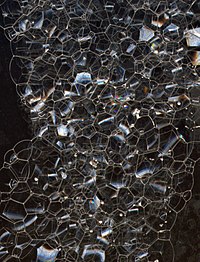
Photo from wikipedia
Abstract Based on the elongated Voronoi models, the yield behaviors of transversely isotropic foams have been explored by using finite element method. A pressure-dependent phenomenological constitutive model (stress potential function)… Click to show full abstract
Abstract Based on the elongated Voronoi models, the yield behaviors of transversely isotropic foams have been explored by using finite element method. A pressure-dependent phenomenological constitutive model (stress potential function) has been established for transversely isotropic foams through the characteristic stress and strain. The stress potential function and its evolution can be determined in terms of the uniaxial and equi-triaxial tensile/compressive characteristic stress-strain curves. The stress potential function is expected to predict the elastoplastic mechanical responses of transversely isotropic foams. The material properties (i.e., relative density, transversely isotropic degree, matrix material and cell morphology) exhibit significant influence on the profile of initial yield surfaces. The pressure dependence of yield surfaces decreases as the relative density and transversely isotropic degree increase. The predictions of pressure-dependent constitutive model match excellently with the simulated yield data under different stress states and characteristic strain stages.
Journal Title: International Journal of Mechanical Sciences
Year Published: 2017
Link to full text (if available)
Share on Social Media: Sign Up to like & get
recommendations!